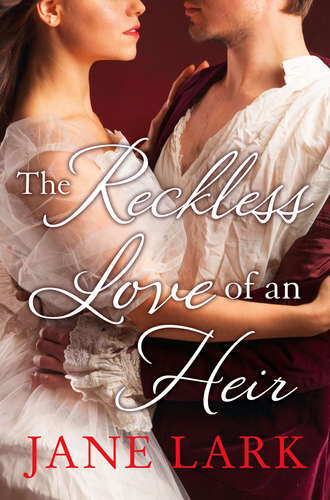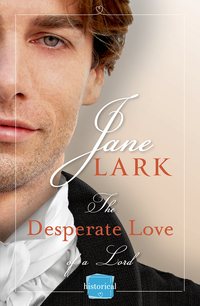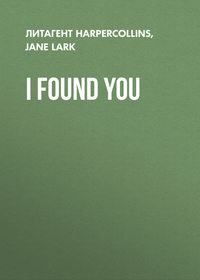
Полная версия
The Reckless Love of an Heir: An epic historical romance perfect for fans of period drama Victoria

PRAISE FOR JANE LARK
‘Jane Lark has an incredible talent to draw the reader in from the first page onwards’
Cosmochicklitan Book Reviews
‘Any description that I give you would not only spoil the story but could not give this book a tenth of the justice that it deserves. Wonderful!’
Candy Coated Book Blog
‘This book held me captive after the first 2 pages. If I could crawl inside and live in there with the characters I would’
A Reading Nurse Blogspot
‘The book swings from truly swoon-worthy, tense and heart wrenching, highly erotic and everything else in between’
BestChickLit.com
‘I love Ms. Lark’s style—beautifully descriptive, emotional and can I say, just plain delicious reading? This is the kind of mixer upper I’ve been looking for in romance lately’
Devastating Reads BlogSpot
The Reckless Love of an Heir
JANE LARK

A division of HarperCollinsPublishers
www.harpercollins.co.uk
HarperImpulse an imprint of
HarperCollinsPublishers
1 London Bridge Street
London SE1 9GF
www.harpercollins.co.uk
First published in Great Britain by HarperImpulse 2016
Copyright © Jane Lark 2016
Cover images © Shutterstock.com
Cover layout design © HarperCollinsPublishers 2016
Cover design by Holly Macdonald
Jane Lark asserts the moral right to
be identified as the author of this work
A catalogue record for this book
is available from the British Library
This novel is entirely a work of fiction. The names, characters and incidents portrayed in it are the work of the author’s imagination. Any resemblance to actual persons, living or dead, events or localities is entirely coincidental.
All rights reserved under International
and Pan-American Copyright Conventions.
By payment of the required fees, you have been granted
the non-exclusive, non-transferable right to access
and read the text of this e-book on screen.
No part of this text may be reproduced, transmitted,
downloaded, decompiled, reverse engineered, or
stored in or introduced into any information storage and
retrieval system, in any form or by any means,
whether electronic or mechanical, now known or
hereinafter invented, without the express
written permission of HarperCollins.
Ebook Edition © July 2016 ISBN: 9780008139834
Version 2016-07-05
Table of Contents
Cover
Praise for Jane Lark
Title Page
Copyright
Chapter One
Chapter Two
Chapter Three
Chapter Four
Chapter Five
Chapter Six
Chapter Seven
Chapter Eight
Chapter Nine
Chapter Ten
Chapter Eleven
Chapter Twelve
Chapter Thirteen
Chapter Fourteen
Chapter Fifteen
Chapter Sixteen
Chapter Seventeen
Chapter Eighteen
Chapter Nineteen
Chapter Twenty
Chapter Twenty-One
Chapter Twenty-Two
Chapter Twenty-Three
Chapter Twenty-Four
Chapter Twenty-Five
Chapter Twenty-Six
Chapter Twenty-Seven
Chapter Twenty-Eight
Chapter Twenty-Nine
Chapter Thirty
Chapter Thirty-One
Chapter Thirty-Two
Epilogue
Author Note
Also by Jane Lark
Jane Lark
About HarperImpulse
About the Publisher
Chapter One
The carriage passed between the large stone lions that held the shields engraved with the Barrington coat of arms and entered the Farnborough Estate through the open wrought iron gates. Henry sighed heavily and removed his foot from the opposite seat of his father’s carriage. The carriage had been sent to town to collect him, on his request.
Pain shot from his right shoulder down to the elbow that was held bent within a sling. His left hand lifted and braced the shoulder.
The damn thing killed. He would be glad to get out of this carriage. Each rut in the road had jolted his arm.
He’d dislocated the shoulder in a fall from his curricle and sprained his wrist besides acquiring several bruises and the bloody thing made it impossible to dress or shave himself and he was equally unable ride a horse, or drive his curricle.
He’d been told by the surgeon in London that he must wear the sling for a month while his shoulder healed, and so he had chosen to come home; where at least he would have his father’s valet and his mother and sisters to look after him.
He picked up his hat from the far seat, using his good hand, and put it on as the carriage passed the gate house then began its journey along the snaking avenue, with its tall horse-chestnut trees either side. The trees were covered in pillars of white spring blossom.
Henry looked towards the distance, between the trees, trying to catch the first glimpse of the house.
Home. He felt a pull from it, a tug at the far end of what had once been a leading rein. The land and property that would one day be his had a place in his chest that inspired pride and affection. Yet, he was equally happy to be away from it. Since he’d resided in London life had opened doors and windows he’d not seen through before. He did not regret moving there at all. It would have been hideous here, once he’d finished at Oxford. The restrictions his father and mother would have set over his life if he’d returned to Farnborough would have been unbearable, he would have become their coddled child again. In London he could do as he wished, without judgement.
There.
He saw the house.
Farnborough was caught in a ray of sunlight that had broken through the clouds, the clouds that had been hovering over the carriage throughout his journey.
The modernised medieval property had a particular charm, and it did tug at his heart, regardless of his lack of regret over leaving it, and the childhood he’d known here, behind.
That small tug became an overwhelming sense of coming home when the carriage passed beneath the archway of the oldest part of the house underneath the ancient portcullis of the original castle. The emotion was spurred by the sound of the horses’ hooves and iron rimmed carriage wheels ringing on the cobble and sending metallic echoes bouncing back from the walls of the house around the courtyard.
His sisters came out, surrounded by his father’s giant grey deerhounds before the carriage had even drawn to a halt, followed by his mother—there was another pull in his chest. Love. He loved his family, no matter that he had left them behind here. It had been easier to leave them because he’d always known when he needed them, they were here.
The dogs’ tails waved in the air like flags of welcome on the castle’s walls, as they surrounded the carriage.
A footman moved before the women to open the carriage door. Henry climbed down, gripping the carriage frame with his left hand, trying not to move his right arm, because the thing still hurt like the devil from all the damned jolts it had endured to get here.
The noise of the fountain running at the centre of the courtyard echoed back from the old stone about him; another sound which spoke of home.
Samson, his favourite among his father’s dogs, slipped his head beneath Henry’s good hand urging Henry for a petting. He stroked behind Samson’s ear in an idle gesture, that recalled years and hours spent with his father’s dogs.
His mother came forward, her arms lifting to embrace him, as her face expressed her concern over the sling holding his arm.
“Mama,” He acknowledged as she wrapped her arms about him.
She held him too tightly, though. He pulled away. “My shoulder.” The jar of pain was sharp and twisted nausea through his stomach as well as shooting pain down his arm and across his back. He gritted his teeth, trying not to wince from it.
“Oh, I am sorry. Are you so badly hurt? You have had your father and I worried beyond measure.”
“How far did you fall?” Christine his youngest sister asked. She was not the youngest of his siblings, though. He had two sisters but his brothers out numbered them two to one. Fortunately the younger ones were away at School and not here to disturb him. The eldest, Percy, the next to Henry in age was twenty and at University in Oxford. Christine was seventeen.
“Too far,” Henry answered her.
“Were you winning the race?”
His good arm settled about Christine’s shoulders, in brotherly comradery, as they all turned to walk towards the house, the dogs with them. “Of course. Do you not remember? I always win.”
Sarah, who was eighteen, and to have her come out in London in a few weeks, was walking ahead of him. She looked over her shoulder and smiled. “I have sent a groom over to the Forths’ to tell Alethea you are home. She wished to know as soon as you arrived so she might call and see you at once.”
Henry smiled. God bless Alethea… He would be required to feel guilty within the hour then. Yet they were not officially engaged. It had been an unspoken agreement cooked up almost from their births. A plan formed between his father and his father’s friend, Uncle Casper, Lord Forth, who owned a neighbouring estate.
After Henry’s birth Lord and Lady Forth had been blessed with a daughter—and probably even while wetting Alethea’s head—it had become the perfect plan, to match the two.
The expectation placed upon him had been talked about as far back as he could remember. He’d never disagreed, nor disliked the idea, it was simply that he had not yet gone along with the plot and said the words that would seal the agreement and he had no intention of doing so during this visit home either. His marriage could wait, he was currently very much enjoying his bachelorhood and he was only twenty-three, it was too bloody young to betroth himself.
“I am sure you need to sit down,” his mother said. “You must be tired. Is it painful still? It must be. Have you taken laudanum?”
“I took some when I last stopped, but it is not intolerable, you need not fuss.” Yet he had come home because he’d known they would fuss and he was in a self-indulgent mood; a mood which appreciated their fussing. It did hurt, and his mother’s concern was the best balm—for a spoilt son.
He smiled at his rumination and allowed Christine to take hold of his good hand and pull him over the threshold of the house.
The square hall welcomed him, with its dark, wide, oak staircase, that wrapped itself about the walls, leading, seemingly, forever upward in an angular ascent. He loved the house. It smelled the same—of polished wood, candle wax and his mother’s perfume.
Christine tugged his hand and pulled him on, not to his father’s stately drawing room in one of the more recently built wings of the house, but to their smaller family drawing room. The dark oak panelling and the window full of Elizabethan lead-lined diamonds, made it seem austere, yet to Henry it induced that final sense of being home more than any other place in the house.
He sat down on an old sofa that his mother had had reupholstered in a gold velvet. The room brought back numerous happy memories of his childhood. This was where they had spent their days when he was young, playing and laughing, and many evenings too when he’d returned from school for the holidays—
“Must your arm remain in the sling always?” Christine asked.
“Always, for a few weeks.”
She made a face at him. “You knew what I meant.”
“You should see my shoulder and my arm, then you would have cause to make a disgusted face, I am black and every shade of red and yellow.” His hip was black too, and half his leg, and elsewhere there were other bruises. He’d truly shaken himself up. He’d lived carelessly his entire life, but his fall had made him realise more than just that he’d nearly broken his arm, he had nearly broken his neck, and the thought of that, that he might not have survived was the thing that had shaken him up. He had been given a second chance at life, he supposed. A chance to consider what he had done with his life. If he had died, he would have left no legacy. He’d spent his years carelessly and recklessly.
“Do you wish for tea and cake? You must be hungry…” His mother did not await his answer but turned to pull the cord to call for a maid. “And if you need to rest,” she said when she turned around, “you are in your old rooms.”
It would be as though he had never left home then. He smiled. He’d needed a sanctuary, and comforting, and as he’d known his mother and sisters were here and ready to offer both. “Thank you, Mama.”
He had at first moved to London to avoid her mollycoddling, and yet now he’d received a hard dose of fate’s medicine he’d realised that at times it had a value. His low spirit craved it.
“Here.” Sarah picked up a cushion from another chair, as Samson settled down, laying beside Henry’s feet and resting his head on Henry’s boot as he’d always done. His tail thumped on the floor as it continued to wave. The other dogs lay down on the hearth rug, their eyes on the returned prodigal son. “Sit back, Henry. Rest against this.”
Christine picked up a cushion too. “You may rest your arm on here.”
They arranged the cushions about him so he might sit more comfortably. Then Christine fetched a footstool for him.
He was being truly pampered. It had been a very good decision to return.
~
“Mama! Mama!”
Susan looked at her sister as Alethea hurried into the drawing room, waving a letter.
“He’s here! At Farnborough! Henry is home!” Alethea turned to the footman. “Please have them prepare the carriage.” Then she looked back at their mother. “Mama we must go. If he is in pain…”
“If he is in pain he deserves to be in pain.” Susan said quietly towards the book which lay open in her lap. She was sensitive of all wounded animals and concerned for those in need, but she did not care for young irresponsible men.
“Susan.” Alethea scowled at her.
She had not intended Alethea to hear.
“How can you be so cruel. It was a terrible accident. He has been injured and you are wishing more harm on him.”
Susan closed the book and set it aside. “He was in an accident because he was driving his curricle foolishly. He only has himself to blame and it was only his arm that was injured, he is hardly in a state that requires extreme sympathy.” And even if he was worse Susan would not feel in the least sympathetic as he’d brought it upon himself. It was his family who ought to receive sympathy for having such a careless, reckless son who constantly treated their concern with no regard.
“Then do not come to visit him with me. You may stay here if you intend to be irritable and rude to him. I have not seen him for months. I will not have the moment ruined.”
Susan did not care. She had no desire to see Henry. In her view he had been a spoilt brat who had grown into a spoilt, insensitive, selfish, careless man. She lifted her eyebrows so they must be arched above the rim of her spectacles, making an I-do-not-care expression at her sister.
“Mama, you will come with me. I cannot go if you do not. Please?”
“I cannot. I am busy. You two will have to settle this argument. Susan will have to accompany you. Your father will be returning in an hour and expect me to be here to receive Mr. Dennison.”
Susan sighed and stood up. She was not to escape Henry’s odious company then. “I am willing, if you wish me to join you.” She was not cruel. She would not deprive her sister of his company when Alethea had waited so long for it. She was not selfish.
“He shall not thank me for bringing you when you are in this mood, but at least then I shall see him. Fetch your bonnet and cloak, I wish to go as soon as we may.” Having cast her commands Alethea turned to leave the room.
That Alethea was very well matched to her anticipated fiancé was not something Susan would say aloud and yet at the back of her mind it was a thought she kept in constant hiding. She did not wish to malign her sister and yet the comparison screamed at her at times.
Alethea stopped at the door and turned back. “Aunt Jane and Uncle Robert will most likely ask us to dine, Mama, and so I doubt we shall return until late. You do not mind?”
“Of course I do not mind, but then you must take two footmen with you as well as the grooms; I will not have you accosted by highwaymen.”
“We are only to drive to Uncle Robert’s. It is the neighbouring estate. We will hardly be accosted in the four miles along the highway.”
“But it will be near dark and we know there are highway men in the area—”
Susan picked up the gauntlet and tackled her mother’s fear. “And no one will know we intend to use that very small stretch of rarely travelled road at that hour. I am sure that highwaymen do not have psychic powers and they would not lay in wait with the potential hope of never seeing a single carriage pass. We will be safe.”
Alethea smiled at Susan, with a look in her eyes that said, thank you, before she left the room.
Susan’s mother shook her head, but her lips twisted in a wry smile. “There is always an answer from you. Your sister should be more grateful.”
Susan did not mean to argue but if there was sense and reason to be spoken or a fact to be taken into account, she would say it, that was all.
Susan gave her mother an amused smile, mimicking the humour her mother had spoken with. “I shall go up to my room and fetch my bonnet and cloak.” She bobbed a very quick curtsy before turning to leave, to prepare for their arduous journey of a few moments.
“Enjoy your day, dear! Give my regards to Jane and Robert!” Her mother called after her.
She did not mind visiting Farnborough really, she liked her aunt and uncle, and Sarah and Christine, Henry’s sisters. And Uncle Robert’s huge library, which was three times the size of her father’s was a strong persuader.
When she walked down the shallow steps to the hall after collecting her things, Alethea awaited her.
“There you are. Hurry!”
Susan smiled. She was as different to her sister as it was possible to be, both in looks and character, and yet they were close. But it was just the two of them, they did not have a large family like Henry’s, or his cousins’. Henry and his cousins had the opportunity to choose the brother or sister who most suited them as their closest confidant, she and Alethea had each other and that was all. Susan was happy for it to be so, though, there was a bond between them that might not exist in a large family.
A footman opened the door. Alethea turned and walked out, at her usual hasty pace.
Alethea was forever in a hurry to experience and enjoy every single moment of life. Susan preferred not to hurry, to dwell on things, to look at them for a length of time and study them in detail, not rush past. She had often stopped Alethea to point out a beautiful view or a wild flower, a butterfly or a bird in a tree. There were so many things that Alethea missed.
Susan smiled at the thought as she stepped off the last stair.
Alethea’s nature was not hers, but it was infectious. She did love her sister no matter that they were so different. Alethea’s enthusiasm could not be ignored.
Susan quickened her pace and hastened out of the door in pursuit.
Alethea was climbing the step into the carriage, her fingers clasping the hand of a footman.
A second footman stood on the plate at the back of the carriage holding the iron bar and an additional groom sat beside the coachman on the box. Susan’s mother had instigated a larger escort for her precious daughters regardless.
Susan took the footman’s hand, climbed the step into the carriage and sat beside Alethea.
“Do you think he may have changed?” Alethea asked when the door shut.
The carriage jolted forward into motion and rocked to the side as the footman who had helped them jumped on to the second perch at the rear.
“It has been less than a year.” Yet it had been nearly a year.
“I know, but he writes of such larks in town, do you think he will think me dull now?”
“He will not think you dull. No one that we know has ever thought you dull.” No one could accuse Alethea of that, she was constantly in motion or conversing.
“But he has the women in London to compare me to and he describes London society as such an improvement on our quiet, country life.”
“Yet the moment he is home he has sent for you. He cannot dislike the idea of your company.”
Alethea looked at Susan and bit her lip for a moment. It was a very slight gesture but Susan noticed the sign of self-consciousness and uncertainty. It was unlike Alethea.
“He did not.” Alethea clarified. “Sarah sent the letter. I asked her to.”
Oh. That redeemed him a little in Susan’s current ill-judgement, if he had not sent for Alethea to come and play nursemaid. “He will love you still,” she reassured. “Merely look at his expression when he sees you and it will show you.”
His brown eyes, the rich colour of sweet chestnuts at the moment their green pods split open, had always lit up with the warmth of an appreciative smile whenever he looked at Alethea. Even when they’d been young he’d thrown glinting looks at Alethea and challenged her to a race or the solving of a conundrum or the telling of the best joke.
But then Alethea had always been the pretty and the vibrant one and Henry the handsomest and wildest. They were well matched.
Susan pressed the tip of her finger on to the bridge of her spectacles and slid them a little farther up her nose. Alethea had golden hair and eyes the colour of forget-me-not petals. She was often called a remarkable beauty in Susan’s hearing. So why would Henry not admire her no matter how pretty the women were in London.
Susan had mousey-brown hair and eyes that were steel-grey not blue. She had never received the same accolade—people did not use the word beautiful to describe her.
It was fortunate, really, that she was not like her sister in character as much as they were unlike in looks, because if she had Alethea’s nature she would be jealous. As it was she was as much in awe of her sister’s beauty as others and she thanked heaven that neither jealousy nor vanity were emotions she was afflicted with. She was quite content to be herself, the less amusing, less charming and less attractive sister. Susan could stand in a room and very easily disappear by simply not speaking, which meant that if she did disappear and leave a room, no one noticed her slip away.







